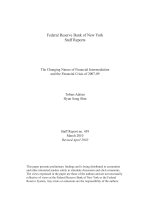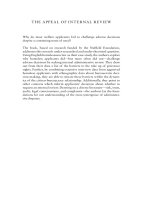Wundt and the philosophical foundations of psychology
Bạn đang xem bản rút gọn của tài liệu. Xem và tải ngay bản đầy đủ của tài liệu tại đây (2.15 MB, 276 trang )
Saulo de Freitas Araujo
Wundt and the
Philosophical
Foundations of
Psychology
A Reappraisal
Wundt and the Philosophical Foundations
of Psychology
Saulo de Freitas Araujo
Wundt and the Philosophical
Foundations of Psychology
A Reappraisal
With Foreword by Annette Mülberger
Saulo de Freitas Araujo
Departamento de Psicologia
Universidade Federal de Juiz de Fora
Juiz de Fora, Minas Gerais, Brazil
ISBN 978-3-319-26634-3
ISBN 978-3-319-26636-7
DOI 10.1007/978-3-319-26636-7
(eBook)
Library of Congress Control Number: 2015956339
Springer Cham Heidelberg New York Dordrecht London
© Springer International Publishing Switzerland 2016
This work is subject to copyright. All rights are reserved by the Publisher, whether the whole or part of
the material is concerned, specifically the rights of translation, reprinting, reuse of illustrations, recitation,
broadcasting, reproduction on microfilms or in any other physical way, and transmission or information
storage and retrieval, electronic adaptation, computer software, or by similar or dissimilar methodology
now known or hereafter developed.
The use of general descriptive names, registered names, trademarks, service marks, etc. in this publication
does not imply, even in the absence of a specific statement, that such names are exempt from the relevant
protective laws and regulations and therefore free for general use.
The publisher, the authors and the editors are safe to assume that the advice and information in this book
are believed to be true and accurate at the date of publication. Neither the publisher nor the authors or the
editors give a warranty, express or implied, with respect to the material contained herein or for any errors
or omissions that may have been made.
Printed on acid-free paper
Springer International Publishing AG Switzerland is part of Springer Science+Business Media
(www.springer.com)
Pois é possível que Eu, causa do Mundo,
Quanto mais em mim mesma me aprofundo
Menos interiormente me conheça?!
(Augusto dos Anjos, Natureza Íntima)
Foreword
Why another book on Wundt? If we look at the twentieth-century literature in the
field of the history of psychology, we can soon see the prominent role that has been
attributed to this historical figure, often referred to as the “founding father of scientific psychology.” When and why did he ascend to these heights in psychology’s
history? It had already happened during his lifetime, when his laboratory became a
“mecca” for scholars interested in what was called a “new” and “scientific” psychology. A number of external factors certainly helped, such as the attractiveness of
German university studies for North-American students and the prestige of Leipzig
University at the time, but Wundt also clearly managed to “sell” his research as a
monumental and innovative project, while converting his laboratory into an
extremely productive scientific institution.
The fact that many of the psychologists who would afterwards obtain influential
and prominent positions in foreign universities (such as S. Hall, E. B. Titchener, and
J. M. Cattell) had been trained in Leipzig undoubtedly contributed to Wundt’s prestige inside and outside the country. It was also in the interest of his students to praise
the quality of their training, paying homage to their mentor. Thus, the historical role
of Leipzig as the “cradle of the new science” was being constantly re-affirmed and
celebrated. Apart from a particular reverence for the master, what these visitors
often grasped and took with them was only a very vague and distorted idea about his
thinking, together with a fascination about psychology as a science based on precise
measurement and experimentation.
Even in his own lifetime, then, Wundt was an author who often was neither fully
read nor fully understood by those invoking his name. He was a typical German
Universitätsgelehrter or Mandarin, who spent his life absorbed by his ambitious
intellectual endeavor of constructing a coherent Weltanschauung (worldview). The
outcome is an impressive, voluminous, and complex opus of more than 50,000
pages. A complete understanding requires an enormous amount of patience, a thorough expertise in eighteenth- and nineteenth-century psychology and philosophy,
and a good knowledge of the German language. Many students and visitors lacked
this and had only a very limited knowledge of Wundt’s project through reviews or a
superficial reading of his famous Grundzüge der physiologischen Psychologie.
vii
viii
Foreword
As a result, Wundt became one of the most cited authors while at the same time
an essential part of his thinking was ignored, misunderstood, and sometimes even
rejected. Immediately, simpler (in the sense of less philosophical, ambitious, and
complex) and more positivist approaches to psychology were adopted, such as those
found in the textbooks of Ebbinghaus, Külpe, and Titchener. Histories written before
Boring’s, such as the biographies of the six “founding fathers” of “modern psychology” written by G. Stanley Hall (1912), dedicated twice as much space to Wundt
than to any of the other founding fathers. Boring’s book on the history of experimental psychology would soon became a landmark in the field, offering a richness of
biographical data clothed in a comprehensive narrative, elaborating on the interplay
between the “great men” and the Zeitgeist of their time. In his account, Helmholtz
and Fechner played the role of immediate forerunners, while the work developed in
Wundt’s laboratory, founded in 1879, was described as the starting point of psychology as an institutionally autonomous and truly experimental science.
The historical research on Wundt initiated by Blumenthal and Danziger at the
centennial celebration of the foundation of his laboratory pointed out the shortcomings, distortions, and even “mystifications” in Boring’s work and tried to offer alternative accounts. Aspects of his work such as his epistemology, Völkerpsychologie,
his journal (Philosophische Studien), and the activities in his institute were thus reexamined. In this process of demystification, Wundt’s approach was redefined as
old-fashioned, conservative, and idealistic. He was presented as an elitist scholar
who defended a conceptual framework that was rarely accepted or followed by others. In addition, his political engagement in the First World War against the allies
and the cultural arrogance of his Elements of Völkerpsychologie were studied.
Moreover, his life-long dedication to philosophy was noted, casting into doubt the
role he had been given in ending the philosophical era of the history of psychology,
and his rejection of what would become the dominant trend, namely applied
psychology, made him appear incomprehensible for most psychologists of the
twentieth and twenty-first centuries. Thus, it comes as no surprise that, after an
enthusiastic reappraisal of Wundt at the centennial celebration, the interest in this
historical figure soon declined. Apart from his rather negative reputation, the value
of his psychology was questioned in similar terms to Titchener’s structuralism.
What can such a psychology, based on an analysis of the content of consciousness
of an abstract human mind, offer that could be of interest?
The present book clearly shows that this attitude is unjustified. Wundt’s psychology stands out as one of the most sophisticated philosophical conceptions of psychological knowledge, offering insights into essential methodological and
conceptual problems of research on thinking, feeling, and perception. His unjustly
neglected work can still serve as an example and inspiration for the development of
current studies on the human mind.
Of course, under the impact of still-growing social concerns and the presence of
Foulcauldian historiography, it is not fashionable to write about Wundt, especially
about Wundt as a philosopher of psychology. Nevertheless, a renewed interest in
this figure has arisen in Brazil. In 2005, Saulo de Freitas Araujo arrived from the
University of Juiz de Fora (in the Region of Minas Gerais) as a doctoral student
Foreword
ix
at Leipzig. He was determined to dedicate himself to reaching an understanding of
Wundt’s huge intellectual endeavor. It would take him years of hard work. The outcome of this effort is the present volume. Already honored by the American
Psychological Association (Division 26), which awarded Araujo the 2013 Early
Career Award, it is clearly not just “another book” or one more celebration of the
Wundtian myth. On the contrary, it constitutes a piece of serious scholarly work,
offering a well-constructed analysis. The book thereby serves excellently as an
introduction to Wundt’s psychology and thinking. His argumentation is easy to follow, voicing accurately the point of view of the Leipzig scholar.
At the same time, it offers a new historical interpretation. Focusing on the close
link established by Wundt between his psychological work and his philosophical
thinking, Araujo offers an insightful view of his intellectual development and the
quest for conceptual coherence. How is his experimental psychology linked to his
Völkerpsychologie? Why did Wundt at a certain point reject the unconscious? Can
he be classified as a Neo-Kantian? How are his principles (psychological laws) connected to his experimental findings and philosophical thinking? Araujo’s comprehensive study offers clearly understandable and novel answers to these questions.
This book is a piece of intellectual history, exemplifying one way to connect the
history and philosophy of science. It stands in clear contrast to previous sociological
analyses. The author starts with a thorough work on the primary sources and thus
avoids the consequences of imposing a previously assumed scheme. Without
attempting to offer a final and complete picture of Wundt’s thinking, Araujo’s
research clearly leads to a major advancement in Wundt scholarship.
CEHIC, Universitat Autònoma de Barcelona
Barcelona, Spain
Annette Mülberger
Preface
This book has a long history, which dates back to 2001, when I entered the PhD
program in philosophy at the State University of Campinas (UNICAMP) in Brazil.
After interrupting my studies for almost 2 years due to health problems, I resumed
them in 2004. I then spent the years 2005 and 2006 in Leipzig, Germany, where I
had access to the Wundt Estate (Wundt Nachlass) at the University Archives, as well
as the different editions of his works in the Wundt-Zimmer at the Psychological
Institute. In 2007, I finally defended my PhD dissertation, which was published in
Portuguese with minor modifications in 2010.
This English edition is not a translation of the Portuguese edition. It is a substantively revised, enlarged, and updated text. It is, in fact, another book. Although the
general thesis remains the same, there is much new material, including primary and
secondary sources, especially with regard to the literature after 2007. I have also
added a new introduction to the book, new sections in each chapter, and new clarifications regarding the intellectual context of the nineteenth century in Germany, in
order to make my arguments clearer and stronger. By the end, I hope to have better
explained some difficult passages of the previous edition, thus rendering the book
more suitable not only to specialists but also to anyone interested in the history and
philosophy of psychology. Thinking of a broader audience, I have added footnotes,
concerning the general context of some passages, which would not be necessary if
the book had been written only for specialists.
Portions of the second chapter originally appeared in Araujo, S. F. (2012).
Why did Wundt abandon his early theory of the unconscious? Towards a new
interpretation of Wundt’s psychological project. History of Psychology, 15(1),
33–49. Copyright © 2012 by the American Psychological Association. Adapted
with permission.
xi
xii
Preface
Citations and Translations
Throughout the book, I use APA style, according to the sixth edition of its Publication
Manual. There are some exceptions, though. Since there is no official edition of
Wundt’s works, I created abbreviations for each of his published books, articles, and
book chapters that I use here (see list of abbreviations). Accordingly, the references
are given by the corresponding abbreviation, followed by the corresponding volume
number (when applicable) in Roman numerals and page numbers in Arabic.
Regarding Kant, I followed the standard practice among Kant scholars, adopting the
Academy Edition (Akademie-Ausgabe) of his writings (Kants gesammelte Schriften
in 29 volumes), edited by de Gruyter. Thus, the references take the abbreviation AA,
followed by the corresponding volume number in Roman numerals and page numbers in Arabic. The only exception, as usual, is the Critique of Pure Reason (CPR),
which is referenced in accordance with the first (A) or second (B) original edition,
followed by the corresponding page numbers. As for the archival funds, I followed
the original abbreviations of each fund, adding the necessary specifications in each
reference (e.g., letter and page number). Finally, in the specific cases of Wolff,
Herbart, and Schopenhauer, I gave the corresponding paragraph numbers instead of
page numbers, as is usual among their interpreters.
Except when otherwise indicated, all the translations of the original German,
French, and Latin passages are mine. For Kant’s works, I used whenever possible
the translations of the Cambridge Edition of the Works of Immanuel Kant, indicating
the exact reference of each translation. As for Wundt, I tried to preserve as much as
possible his original style. His writing is very elegant but extremely complex, following the typical nineteenth-century style of German philosophy, with long paragraphs composed of many subordinate clauses. Sometimes, it was not easy to find
an adequate translation in English, but I tried to be as accurate as possible. Whenever
I had to choose between accuracy and beauty, I opted for the former. Not being a
native speaker of either German or English has made things more difficult. In any
case, I hope to have been faithful to Wundt’s thought. The extent to which I have
succeeded I leave for every reader to judge for him/herself.
Juiz de Fora, Brazil
Saulo de Freitas Araujo
Acknowledgments
During all these years, I have been in the unpayable debt of many people. First, to
my PhD supervisor in Brazil, Prof. Dr. Luiz Roberto Monzani, with whom I have
learned to respect and admire the history of philosophy. I am equally grateful to
Prof. Dr. Ortrun Riha and all the members of the Karl-Sudhoff-Institut für Geschichte
der Medizin und der Naturwissenschaften at Leipzig University, where I found an
excellent environment to develop my research. Dr. Anneros Meischner-Metge,
responsible for the Wundt-Zimmer, gave me invaluable help and information regarding Wundt’s work and the history of psychology in Leipzig. Dr. Jens Blecher, Sandy
Muhl, and Michael Natho at the University Archives in Leipzig made my archival
research much easier. Dr. Werner Moritz at the University Archives in Heidelberg
saved me much time during my visit there.
Regarding this English edition, it was mostly prepared during my sabbatical
leave at the Autonomous University of Barcelona (Spain), where I spent the period
2013/2014 as guest scholar in the Philosophy Department, whose members I thank
for their generous reception. I am especially grateful to Thomas Sturm and Annette
Mülberger for reading and commenting on the manuscript and for the inspiring
intellectual exchanges we have had in recent years. Their rigorous and critical reading and our lively debates have been invaluable to me. I am also grateful to the
members of CEHIC (Centre for the History of Science), who invited me to present
the plan and the main ideas of the book, followed by a general discussion: Augustí
Nieto Galan, Fernando Vidal, Massimiliano Badino, Lino Camprubí, Oliver
Hochadel, and Xavier Roqué.
Since the publication of the Portuguese edition, I have had the opportunity to
present and discuss ideas with many scholars in North America and Europe. I would
like to thank Wade Pickren and Alexandra Rutherford for their generosity and keen
interest in making a North-American audience aware of my scholarship. I also thank
the members of the Cheiron Society and the Society for the History of Psychology
(APA’s Division 26) for their comments and suggestions: William Woodward,
David Robinson, Rand Evans, Christopher Green, Andrew Winston, Thomas Teo,
xiii
xiv
Acknowledgments
and Hank Stam, among others. I am especially grateful to the Society for the History
of Psychology for selecting me for the 2013 Early Career Award, which gave me
extra motivation for this English edition.
I also thank the members of the European Society for the History of Human
Sciences (ESHHS), as well as the following scholars, for discussing with me some
of the ideas presented in this book: Theodore Arabatzis, Sara Dellantonio, Georg
Eckardt, Jochen Fahrenberg, Horst Gundlach, Gary Hatfield, Barbara Held, Gerd
Jüttemann, Marco Innamorati, Margret Kaiser-El-Safti, Ingrid Kästner, Klaus
Christian Köhnke (in memoriam), Joel Michell, Serge Nicolas, Wolfgang Nitsche,
Lisa Osbeck, Luigi Pastore, Sonu Shamdasani, Roger Smith, Andreas Sommer,
Lothar and Helga Sprung, Holger Steinberg, and Thomas Wendt.
I am equally grateful to Judy Jones at Springer for her support.
I am greatly indebted to my Brazilian colleagues in the Psychology Department
and the Graduate Program in Psychology at the Federal University of Juiz de Fora
(UFJF) for assuming my activities during my sabbatical leave. José Antônio
Damásio Abib, Alexander Moreira-Almeida, Luis Henrique Dreher, and Andrea
Faggion have made comments and suggestions that I have incorporated into this
English edition.
Last but not least, I am grateful to DAAD (German Academic Exchange Service),
CNPq (National Council for Scientific and Technological Development), CAPES
(Brazilian Federal Agency for Support and Evaluation of Graduate Education), and
PROPG (Pro-rectorate for Graduate Studies) at the UFJF for financial support.
Juiz de Fora, Brazil
Saulo de Freitas Araujo
Contents
1
Introduction ...............................................................................................
1.1 German Psychology Before Wundt: An Overview ............................
1.2 A Brief History of Wundt Scholarship and Its Problems...................
1.3 General Methodological Remarks .....................................................
1.4 Thesis and Structure of the Book .......................................................
1
1
6
12
19
2
The Logical Mind: Wundt’s Early Psychological Project .....................
2.1 The Need for Reform .........................................................................
2.2 A Program for a Scientific Psychology..............................................
2.3 The Logical Theory of the Mind and Unconscious Inferences..........
2.4 The Vorlesungen as Realization of Wundt’s Early
Psychological Project .........................................................................
2.5 The Relationship between Psychology and Philosophy
in Wundt’s Early Work.......................................................................
2.6 Intellectual Roots of the Young Wundt ..............................................
21
22
26
36
45
58
64
3
The Grundzüge and the Abandonment of the Unconscious .................. 81
3.1 Abandoning Mental Panlogism (Thesis 1) ........................................ 83
3.2 The Grundzüge and the Rejection of the Unconscious (Thesis 2)..... 87
3.3 The “Axioms of Physics” and Wundt’s Philosophical
Development ...................................................................................... 92
3.4 A New Theory of Consciousness ....................................................... 98
3.5 Kant’s Influence ................................................................................. 103
3.6 Wundt and the Beginnings of Neo-Kantianism ................................. 118
4
Wundt’s Idea of a Scientific Philosophy..................................................
4.1 Toward a Scientific Philosophy ..........................................................
4.2 Logic and Theory of Knowledge .......................................................
4.3 The Logical Evolution of Knowledge and the Concept
of Experience .....................................................................................
4.4 Categories of Scientific Knowledge ...................................................
4.5 Beyond Kant, Neo-Kantianism and Positivism: A New Idealism? .....
125
126
134
137
144
154
xv
xvi
Contents
5
Wundt’s Mature Project of a Scientific Psychology ...............................
5.1 Between the Naturwissenschaften and the Geisteswissenschaften .........
5.2 Branches of Psychological Investigation ...........................................
5.3 The Theoretical Principles of Psychology .........................................
5.4 Wundt’s Voluntarism ..........................................................................
167
168
173
191
202
6
Concluding Remarks ................................................................................ 209
Sources ............................................................................................................. 215
References ........................................................................................................ 219
Index ................................................................................................................. 247
About the Author
Saulo de Freitas Araujo, Ph.D. is Professor for the History and Philosophy of
Psychology at the Federal University of Juiz de Fora (Brazil), Department of
Psychology. He is also director of the Wilhelm Wundt Center for the History and
Philosophy of Psychology at the same institution. His research is primarily concerned with the history and philosophy of scientific psychology. He has published,
among others, “Psychology and Neuroscience: An Evaluation of Contemporary
Materialism” (2011), “History and Philosophy of Psychology: Contemporary
Perspectives” (2012), “Echoes of the Past: Studies in the History and Philosophy of
Psychology” (2013), “Philosophical Foundations of Contemporary Psychology”
(2014), and “Current Topics in the History and Philosophy of Psychology” (2015).
His work on Wundt has been awarded the 2013 Early Career Award from the
American Psychological Association (Division 26).
xvii
Abbreviations
Archival Funds
UAH, H-III-111
UAH, PA
UAL, NW
Universitätsarchiv Heidelberg, Akten der medizinischen
Fakultät
Universitätsarchiv Heidelberg, Personalakte
Universitätsarchiv Leipzig, Nachlass Wundt
Kant’s Works
AA
CPR
Akademie-Ausgabe. Kants gesammelte Schriften (29 Vols.), 1900ff.
Critique of Pure Reaon, First Edition (A) and Second Edition (B)
Wundt’s Works (in alphabetical order)1
AEP
BBA
BTS
CIC
DTP
DGG
EB
EDW1
EDW2
1
Die Aufgaben der experimentellen Psychologie (1882)
Berichtigende Bemerkung zu dem Aufsatze des Herrn B. Erdmann
(1880)
Beiträge zur Theorie der Sinneswahrnehmung (1862)
Central innervation and consciousness (1876)
Die Thierpsychologie (1885)
Die Geschwindigkeit des Gedankens (1862)
Eine Berichtigung (1915)
Die Entwicklung des Willens (1885)
Die Entwicklung des Willens (1906)
The chronological order of these works is presented as part of the sources at the end of the book.
xix
xx
EE
EMP
EPhi
EPsy
Eth
EVP
GDP
GPP1
GPP2
GPP3
GPP4
GPP5
GPP6
GUS
GWL
HMP
IEP
KNA
L1
L2
L3
L4
LEI
LHA
LMB
LPM1
LPM2
LPM3
LPM4
LUP
MVG
NKR1
NKR2
NKR3
NLG
NWP1
NWP2
PAC
PIG
PKD
PMN
PUL
RCor
RGer
Abbreviations
Erlebtes und Erkanntes (1920)
Über empirische und metaphysische Psychologie (1904)
Einleitung in die Philosophie (1918)
Einführung in die Psychologie (1911)
Ethik (1886)
Elemente der Völkerpsychologie (1912)
Grundriss der Psychologie (1896)
Grundzüge der Physiologischen Psychologie (1874)
Grundzüge der Physiologischen Psychologie. 2nd ed. 2 vols. (1880)
Grundzüge der Physiologischen Psychologie. 3rd ed. 2 vols. (1887)
Grundzüge der Physiologischen Psychologie. 4th ed. 2 vols. (1893)
Grundzüge der Physiologischen Psychologie. 5th ed. 3 vols (1902–1903)
Grundzüge der Physiologischen Psychologie. 6th ed. 3 vols. (1908–1911)
Gehirn und Seele (1880)
Gottfried Wilhelm Leibniz (1913)
Handbuch der medicinischen Physik (1867)
Das Institut für experimentelle Psychologie (1909)
Kritische Nachlese zur Ausfragemethode (1908)
Logik, 2 vols. (1880–1883)
Logik. 2nd ed. Vol. II.2 (1895)
Logik. 3rd ed. Vol. I (1906)
Logik. 4th ed. Vol. III (1921)
Leibniz. Zu seinem 200 jährigen Todestag (1917)
Lectures on human and animal psychology (1912)
Die Lehre von der Muskelbewegung (1858)
Lehrbuch der Physiologie des Menschen (1865)
Lehrbuch der Physiologie des Menschen. 2nd ed. (1868)
Lehrbuch der Physiologie des Menschen. 3rd ed. (1873)
Lehrbuch der Physiologie des Menschen. 4th ed. (1878)
Logik und Psychologie (1910)
Die Metaphysik in Vergangenheit und Gegenwart (1902)
Ueber naiven und kritischen Realismus. Erster Artikel (1896)
Ueber naiven und kritischen Realismus. Zweiter Artikel (1898)
Ueber naiven und kritischen Realismus. Dritter Artikel (1898)
Neuere Leistungen auf dem Gebiete der physiologischen Psychologie (1867)
Naturwissenschaft und Psychologie (1903)
Naturwissenschaft und Psychologie. 2nd ed. (1911)
Die Physikalischen Axiome und Ihre Beziehung zum Causalprincip (1866)
Philosophy in Germany (1877)
Die Psychologie im Kampf ums Dasein (1913)
Die Prinzipien der mechanischen Naturlehre (1910)
Psychologismus und Logizismus (1910)
Rezension von Cornelius’ Grundzüge einer Molecularphysik (1866)
Rezension von Gerbers Die Sprache und das Erkennen (1886)
Abbreviations
RHae
RHar
RHel
RHer
RSpe1
RSpe2
RSpe3
RSpe4
SDS
SGS
SIW
SP1
SP2
SP4
SUD
SÜW
UAE
UAP
UBG
UDP
UEG
UEP
UEW
UHK
UPA
UPC
UPK
UPM
UVE
UZW
VEP
VMT1
VMT2
VPK
VPS
WSK
xxi
Rezension von Haeckels Generelle Morphologie der Organismen (1867)
Rezension von Harms’ Philosopische Einleitung in die Encyclopädie der
Physik (1870)
Rezension von Helmholtz’ Handbuch der physiologischen Optik (1867)
Rezension von Hermanns Die Sprachwissenschaft nach ihrem
Zusammenhang mit Logik, menschlicher Geistesbildung und Philosophie
(1876)
Rezension von Spencers Grundlagen der Philosophie (1875)
Rezension von Spencers Einleitung in das Studium der Sociologie (1876)
Rezension von Spencers System der synthetischen Philosophie, II:
Die Principien der Biologie, Band 1 (1877)
Rezension von Spencers System der synthetischen Philosophie, II:
Die Principien der Biologie, Band 2 (1878)
Das Sittliche in der Sprache (1886)
Sprachgeschichte und Sprachpsychologie (1901)
Selbstbeobachtung und innere Wahrnehmung (1888)
System der Philosophie (1889)
System der Philosophie. 2nd ed. (1897)
System der Philosophie. 4th ed. (1919)
Die Sprache und das Denken (1885)
Sinnliche und Übersinnliche Welt (1914)
Über Ausfrageexperimente und über die Methoden zur Psychologie des
Denkens (1907)
Ueber die Aufgabe der Philosophie in der Gegenwart (1874)
Ueber den Begriff des Gesetzes, mit Rücksicht auf die Frage der
Ausnahmslosigkeit der Lautgesetze (1886)
Über die Definition der Psychologie (1896)
Über die Entstehung räumlicher Gesichtswahrnehmungen (1869)
Über den Einfluss der Philosophie auf die Erfahrungswissenschaften (1876)
Ueber die Eintheilung der Wissenschaften (1889)
Ueber Dr. Hering’s Kritik meiner Theorie des binocularen Sehens (1863)
Über die physikalischen Axiome (1886)
Ueber psychische Causalität und das Princip des psychophysischen
Parallelismus (1894)
Über psychische Kausalität (1911)
Über psychologische Methoden (1883)
Über das Verhältnis des Einzelnen zur Gemeinschaft (1891/1913)
Ueber Ziele und Wege der Völkerpsychologie (1888)
Völkerpsychologie und Entwicklungspsychologie (1916)
Vorlesungen über die Menschen- und Thierseele (1863)
Vorlesungen über die Menschen- und Thierseele. 2nd ed. (1892)
Völkerpsychologie. Kultur und Geschichte (1920)
Völkerpsychologie. Die Sprache (1900)
Was soll uns Kant nicht sein? (1892)
xxii
ZFL
ZKS
ZLG
ZLW
ZWV
Abbreviations
Zur Frage der Localisation der Grosshirnfunctionen (1891)
Zur Kritik des Seelenbegriffs (1885)
Zur Lehre von den Gemüthsbewegungen (1891)
Zur Lehre vom Willen (1883)
Ziele und Wege der Völkerpsychologie (1911)
Chapter 1
Introduction
This book is intended to be a philosophical history of psychology, that is, a history
of psychology guided by specific philosophical questions, the most important of
which is the general relationship between psychology and philosophy. At the same
time, the book’s subject matter can be considered a case study in the History and
Philosophy of Science. By placing Wundt’s psychological project in its historical
context, I want to demonstrate how his project is intertwined with his philosophical
assumptions and interests. Thus, the book offers an example of the relationship
between psychology and philosophy in the nineteenth and early twentieth centuries.
Furthermore, by focusing my analysis on Wundt’s intellectual development and by
showing the formation of his philosophical program, I offer a new interpretation of
his conception of scientific psychology that tries to be faithful to the systematic
character of his thought, in contrast to much of the traditional historiography of
psychology, which presents a rather fragmented, sometimes unilateral treatment of
his ideas. It is, so to speak, ‘a view from above’; that is, I see Wundt’s psychology
as part of his highest epistemic ideals, which are philosophical in their essence.
From the beginning, it must be clear that throughout the book, the term ‘psychology’ will be understood as a science, the aim of which is to obtain theoretical
knowledge. For Wundt, psychology was never intended to solve individual, social,
or cultural problems. The justification for all these claims is given in the following
sections, which serve as a general introduction to the book.
1.1
German Psychology Before Wundt: An Overview
Before beginning the presentation and discussion of Wundt’s psychological project,
I would like to offer a very brief description of the historical background that favored
its emergence and development. More specifically, I want to focus this brief contextualization on the emergence of different conceptions of scientific psychology
© Springer International Publishing Switzerland 2016
S.d.F. Araujo, Wundt and the Philosophical Foundations of Psychology,
DOI 10.1007/978-3-319-26636-7_1
1
2
1
Introduction
within the German tradition up to the first half of the nineteenth century.1 Other,
more specific aspects will be discussed throughout the book, according to their pertinence to specific questions raised in each chapter.
Horst Gundlach (2004a, 2004b, 2006) has introduced an important conceptual
distinction to the historiography of psychology. According to him, the term ‘psychology’ can refer to both a field of knowledge or science (Gebiet, Wissenschaft)
and to a discipline in the strict sense (Fach, Disziplin), that is, an institutionalized
subject, the teaching of which is mandatory for a specific professional training.2
Accordingly, in its first meaning, psychology is much older than in its second,
although both meanings intersect in the nineteenth century.3 Thus, I want to make it
clear that I am using the term ‘psychology’ in the primary way that Wundt understood it: as a science, a field of knowledge with a proper subject matter (the mind),
a specific vocabulary, and specific methods of investigation, the central aim of
which is to obtain theoretical knowledge.
It is no novelty that there was a long German psychological tradition before
Wundt, as the literature shows (e.g., Bell, 2005; Carus, 1808; Dessoir, 1902; Laehr,
1900; Meischner-Metge, 2009; Sachs-Hombach, 1993; Sommer, 1892). The term
‘psychology’ appeared in German culture for the first time in the sixteenth century,
mostly in relation to discussions about Aristotle’s De Anima or the immortality of
the soul (Brozek, 1999; Lapointe, 1970, 1972; Luccio, 2013; Park & Kessler, 1988;
Scheerer, 1989; Vidal, 2011). However, it is not enough to follow the history of the
term, because it was not univocal; it was often intercalated with other terms, such as
‘pneumatology’ and ‘anthropology’ (Sturm, 2009; Vidal, 2011); and most important of all, it did not designate an independent or new field of knowledge.4
It seems that, as an autonomous science (Wissenschaft) of the mind—an organized and systematic field of knowledge with a proper subject matter (the mind), a
specific vocabulary, and new methods of investigation—psychology first appeared in
the eighteenth century, as recent literature suggests (e.g., Brauns, 2002; Fox, 1987;
1
This does not mean that British and French intellectual traditions are not relevant to Wundt’s
project. As I will show in the following chapters, Wundt was well acquainted with British and
French ideas (e.g., positivism). However, his motivation for establishing a new psychology grew
out of his dissatisfaction with the German psychological tradition preceding him.
2
For an alternative and broader understanding of the term ‘discipline,’ as well as its implications
for the history of psychology, see Vidal (2011, pp. 3–8).
3
This happened first in Germany, as a result of its significant educational reforms in the first
decades of the nineteenth century. For a broader context of such reforms, see Nipperdey (1998)
and Wehler (2008a, 2008b).
4
According to Park and Kessler, “philosophers and scientists of the Renaissance did not treat psychology, the philosophical study of the soul, as an independent discipline. Following the medieval
tradition, they placed it within the broader context of natural philosophy, and they approached it,
like the other sub-divisions of natural philosophy, through the works of Aristotle, notably De
anima and the Parva naturalia” (Park & Kessler, 1988, p. 455, emphasis in original). Vidal comes
to the same conclusion: “The term psychologia may well have named certain discourses linked to
new ways of thinking about the scientia de anima in sixteenth-century Protestant Germany, but it
certainly was not conceptualized in terms of a radical break or presented as a new field of empirical
knowledge” (Vidal, 2011, pp. 29–30, emphasis in original).









